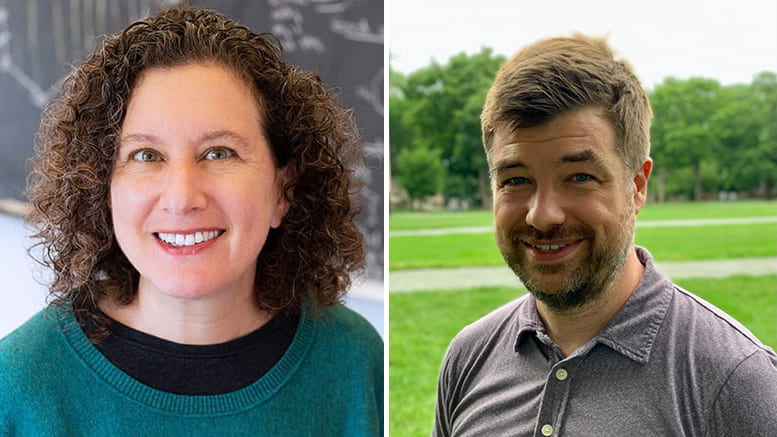Northwestern’s Department of Mathematics strengthens standing as a leader in dynamics with NSF Research Training Grant
October 17, 2022

A new $2.5 million Research Training Grant from the National Science Foundation promises to expand research, enliven student interest, and elevate Northwestern University’s standing in the fast-charging field of dynamics.
Spread over five years, the grant aims to increase the strength of research in dynamics at Northwestern and across the U.S. while simultaneously increasing the pipeline of talented students entering dynamics.
“This grant puts us in a handful of the world’s most elite programs in dynamics and gives us the power to train more people to be experts in dynamical systems and its techniques,” says Bryna Kra, the Sarah Rebecca Roland Professor of Mathematics at Northwestern University and the grant’s principal investigator (PI).
Creating a hub for dynamics
The study of how systems evolve over time, dynamics cuts across different areas of mathematics and applies to various subfields of mathematics and science, including geometry, physics, number theory, and planetary motion. Kra and her co-PIs – Department of Mathematics colleagues Professors Nir Avni, Aaron Brown, Ilya Khayutin, and Jared Wunsch – specialize in a range of dynamical fields themselves, including ergodic theory, homogeneous dynamics, topological dynamics, quantum mechanics, smooth dynamics and Hamiltonian dynamics. They apply dynamics to study problems in a wide range of fields including number theory, combinatorics, partial differential equations, group theory, geometry and representation theory.
The Research Training Grant fuels Northwestern’s efforts to foster groundbreaking scholarship and training in dynamics, including funding postdoctoral fellowships, graduate student research opportunities at Northwestern, conferences, lectures, and workshops as well as national and international research collaborations.
The grant team’s work began in earnest this fall. On September 20, the Department of Mathematics hosted its inaugural Dynamical Systems Seminar featuring University of Illinois Chicago researcher Benjamin Call. Three weeks later, the department held its first Dynamics Day mini-conference of the academic year with presentations from researchers representing four universities.
“Over the next five years, Northwestern will become a prominent hub for dynamics as we dramatically increase our activity level with the support of this Research Training Grant,” Kra says.
Driving dynamics forward
The grant’s more ambitious goal, however, is to increase student participation in dynamics research and education at every level, a mission designed to drive U.S. competitiveness in the internationally visible field. Kra promises summer thematic schools, research workshops, and research experiences for undergraduates as well as revisions and expansions of the curriculum to bolster student interest in dynamics.
“We certainly want to help students become more interested in and proficient in dynamics and its techniques so we’re pushing the nation’s standing in dynamics forward,” Kra says, who also notes plans for a particular focus on training students from historically underrepresented groups to cultivate a stronger, more diverse scientific workforce.
The Research Training Grant is the latest award heightening the Department of Mathematics’ reputation in dynamics and underscoring its enterprising efforts to advance the field.
In September 2021, the Breakthrough Prize Foundation awarded the prestigious 2022 New Horizons in Mathematics prize to Professor Aaron Brown. The honor recognizes early-career researchers who have already produced important work. Brown and his collaborator, Sebastian Hurtado, then at the University of Chicago, received the $100,000 award for contributions to the proof of Zimmer’s conjecture, a renowned and long-standing open problem on when geometric spaces can exhibit special kinds of symmetries.
“We have a world-leading group here investigating dynamics and we continue to see this momentum accelerate,” Department of Mathematics chair Ben Weinkove says. “Aaron’s award and the Research Training Grant further establish Northwestern’s credentials in this important field of mathematics and demonstrate our commitment to being a leader in dynamics research and education.”
AI & Data

Northwestern accelerates quantum research with NVIDIA technology
September 19, 2025
NVIDIA code could help researchers tackle computationally demanding tasks hindering quantum research Northwestern University physicists are using NVIDIA technology to tackle the computationally demanding tasks hindering quantum research. Northwestern theoretical physicist Jens Koch and his research group…

New Curriculum Leverages VR To Promote Intercultural Understanding
February 24, 2025
Claudia Quevedo-Webb, César Hoyos Álvarez, María Jesús Barros García and Spencer Striker have been named the 2025 recipients of the Alumnae of Northwestern University’s Award for Curriculum Innovation. Quevedo-Webb, Hoyos Álvarez and Barros García will incorporate virtual…

Love Data Week: NU Students Shine in Data Viz Championship
February 13, 2025
This Valentine’s Day, show your love for data. Northwestern students, faculty, and staff participate in a week-long celebration of data storytelling, creativity, and innovation as part of the international Love Data Week event. The week…

Don’t Be Duped: Here’s How to Spot Deepfakes
October 24, 2024
Not all deepfakes are bad. Deepfakes — digital artifacts including photos, videos and audio that have been generated or modified using artificial intelligence (AI) software — often look and sound real. Deepfake content has been…



